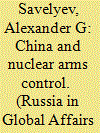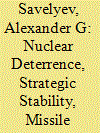| Srl | Item |
| 1 |
ID:
174874


|
|
|
|
|
| Summary/Abstract |
Beijing explains its firm unwillingness to join the United States and Russia in nuclear arms control talks by the fact that China’s nuclear arsenal is incomparable with respective potentials of the world’s two leading nuclear powers. China urges Russia and the U.S. to go ahead with the nuclear disarmament process on a bilateral basis, and promises it will be prepared to consider the possibility of its participation in the negotiations only when its counterparts have downgraded their arsenals approximately to China’s level. Washington finds this totally unacceptable and demands that China either join the existing Russian-U.S. strategic New START treaty right away or agree to enter into a trilateral nuclear arms control format. This article studies the prospects of China’s involvement in nuclear arms talks and analyzes the true reasons behind Beijing’s desire to avoid any nuclear disarmament deals at this point. The working hypothesis of this paper is that China’s stance on the above issue is by no means far-fetched or propagandistic, and that it is driven by fundamental political, military and strategic considerations. Disregard for this factor and further forceful efforts to bring China to the negotiating table to discuss nuclear arms control will lead to failure.
|
|
|
|
|
|
|
|
|
|
|
|
|
|
|
|
| 2 |
ID:
192491


|
|
|
|
|
| Summary/Abstract |
The article addresses a set of problems pertaining to nuclear deterrence,
strategic stability, and missile defense. The author states that as a derivative
of nuclear deterrence strategic stability can only be applied to military-
strategic relations between Russia and the United States. This concept
“does not work” in all other cases, including the multilateral format of
relations. Nuclear deterrence is more universal and impacts, among other
things, the decision-making process in relatively strong and weak nuclear
states that oppose each other. The effectiveness of nuclear deterrence is
not determined solely by the balance of opposing forces. No less important
is the assessment by a potential aggressor of all the negative consequences
of its decision to strike first, which creates the “self-deterrence” effect that
outweighs even the aggressor’s absolute confidence in the complete military
success of its nuclear attack.
|
|
|
|
|
|
|
|
|
|
|
|
|
|
|
|
| 3 |
ID:
052089


|
|
|
|
|
| Publication |
March 2004.
|
| Summary/Abstract |
Space presents realistic opportunities for US-Russian cooperation. But how can the two countries cooperate while also protecting their own national interests? Can the US afford to go it alone in space? What will be the long-term effect of the commercialization of space? Faced with ever declining space-technology budgets, Russia needs international cooperation if its space industry is to survive. At the same time, the US has shifted its interests away from cooperation and toward the military aspects of space. Further, the author says, the US has been inclined to solve problems unilaterally. But the author contends that the US is critically dependent on Russian launchers and that both countries would benefit from mutual efforts and expertise. Potential areas for joint work include ballistic-missile defense, protecting space-based systems, and data exchange on space objects. All of the foregoing, the author notes, would support national and international security.
|
|
|
|
|
|
|
|
|
|
|
|
|
|
|
|